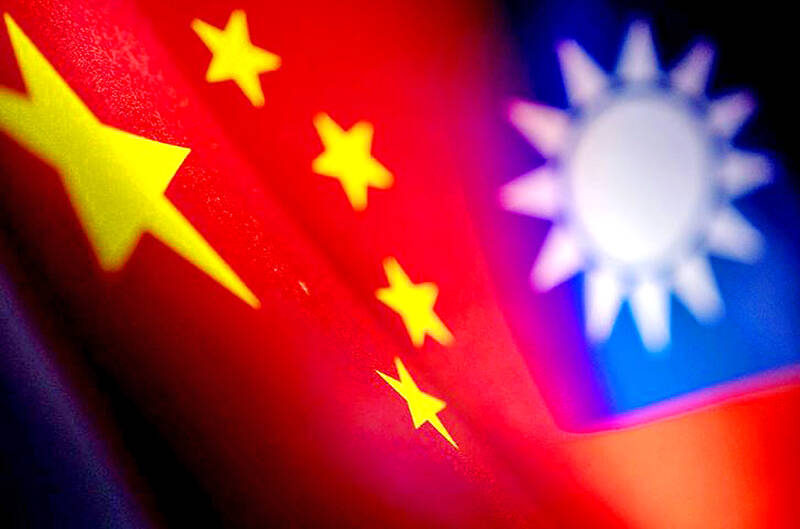China might use methods of mass coercion against Taiwan to force it to cede to its demands without the need for conventional warfare, the American Enterprise Institute said in a report on Monday last week.
“The US must recognize the possibility and danger of a coercion campaign that is far more intense than the one currently ongoing against Taiwan and develop ways to prevent Taiwan’s isolation through means short of war,” the Washington-based think tank said.
The report studies a potential strategy that Beijing could employ in a bid to force Taiwan to capitulate by engaging in an “anti-separation” strategy, tackling the issue on four fronts: opposing Taiwan-US cooperation; eroding Taipei’s ability to operate, cyberwarfare and disinformation.

Photo: Reuters
These tactics would involve convincing Taiwanese and Americans that cooperation would lead to escalation, eroding the government’s ability to provide essential services through air and sea closures, extensive and persistent cognitive warfare to break the will to resist among Taiwanese and campaigns to decrease support for Taiwan among the US public and officials, the report said.
Radio Free Asia on Friday last week said that China would likely ramp up its “united front” efforts against Taiwan over the next four years with President William Lai (賴清德) in office, with the aim of obstructing the international community’s support for Taiwan.
Beijing would aim to force Taiwan to accept a “peace process” or “unification agreement” by 2028, Radio Free Asia said.
Dan Blumenthal, author of the report and senior fellow at the institute, said that the US and its allies are too focused on deterring or repelling a military conflict with the Chinese People’s Liberation Army, while ignoring “non-war threats” from China.
The US and its allies must soon change focus and take aim at Chinese coercion, the report added.
“The US, Taiwan and a global coalition of states are entirely capable of developing adequate countermeasures to deter and defeat a PRC [People’s Republic of China] coercion campaign targeting Taiwan through immediate action and close coordination,” it said.
“We recommend that Taiwan develop the capability to counter a wide range of PRC coercive actions aimed at decreasing ROC [Republic of China] governmental capacity and the Taiwanese public’s desire for autonomy,” it added.

TRAFFIC SAFETY RULES: A positive result in a drug test would result in a two-year license suspension for the driver and vehicle, and a fine of up to NT$180,000 The Ministry of Transportation and Communications is to authorize police to conduct roadside saliva tests by the end of the year to deter people from driving while under the influence of narcotics, it said yesterday. The ministry last month unveiled a draft of amended regulations governing traffic safety rules and penalties, which included provisions empowering police to conduct mandatory saliva tests on drivers. While currently rules authorize police to use oral fluid testing kits for signs of drug use, they do not establish penalties for noncompliance or operating procedures for officers to follow, the ministry said. The proposed changes to the regulations require

The Executive Yuan yesterday announced that registration for a one-time universal NT$10,000 cash handout to help people in Taiwan survive US tariffs and inflation would start on Nov. 5, with payouts available as early as Nov. 12. Who is eligible for the handout? Registered Taiwanese nationals are eligible, including those born in Taiwan before April 30 next year with a birth certificate. Non-registered nationals with residence permits, foreign permanent residents and foreign spouses of Taiwanese citizens with residence permits also qualify for the handouts. For people who meet the eligibility requirements, but passed away between yesterday and April 30 next year, surviving family members

Taiwanese officials are courting podcasters and influencers aligned with US President Donald Trump as they grow more worried the US leader could undermine Taiwanese interests in talks with China, people familiar with the matter said. Trump has said Taiwan would likely be on the agenda when he is expected to meet Chinese President Xi Jinping (習近平) next week in a bid to resolve persistent trade tensions. China has asked the White House to officially declare it “opposes” Taiwanese independence, Bloomberg reported last month, a concession that would mark a major diplomatic win for Beijing. President William Lai (賴清德) and his top officials

The German city of Hamburg on Oct. 14 named a bridge “Kaohsiung-Brucke” after the Taiwanese city of Kaohsiung. The footbridge, formerly known as F566, is to the east of the Speicherstadt, the world’s largest warehouse district, and connects the Dar-es-Salaam-Platz to the Brooktorpromenade near the Port of Hamburg on the Elbe River. Timo Fischer, a Free Democratic Party member of the Hamburg-Mitte District Assembly, in May last year proposed the name change with support from members of the Social Democratic Party and the Christian Democratic Union. Kaohsiung and Hamburg in 1999 inked a sister city agreement, but despite more than a quarter-century of